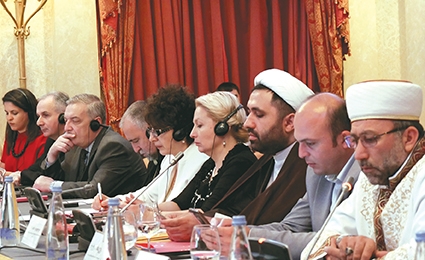Religious Organizations Unite to Prevent Violence against Women & Girls
The family is an assenting unit based on equality, where people live harmoniously and treat each other with respect and affection and also care for each other, - read a statement by the Administration of Muslims of All Georgia following the July 11 conference ‘The Role of Religion in the Prevention of Violence against Women and Girls’. “A favorable family environment is essential for a person’s personal development and full realization of his/her potential. Building a healthy family foundation requires physical as well as moral and physocological maturity. A couple has to assume a great responsibily while raising a family and bear in mind that it requires loyalty, dedication and coping with various challenges,” – the statement went on.
The conference was held on the initiative of the Inter-agency on Gender Equality, the Administration of Muslims of All Georgia, the Union 21st Century, and United States Nations Population Fund (UNFPA). The goal was to bring together the representative clergy of all the major religions in Georgia, NGOs and government representatives, to discuss their role in the prevention and elimination of violence and harmful practices against women and girls in support of state efforts in this direction.
Numerous acts of violence against women and girls remain a reality in Georgia. Domestic violence and early marriage are still very problematic. It is widely believed that a girl married before 18 is affected by social isolation, a lack of education, and may also fall victim to domestic violence or sexual abuse, since the relationship with her husband is unequal. If she gets pregnant, there can be complications because her body is unprepared for bearing a child.
Last year, cases of female genital mutilation (FGM) were reported in Kvareli municipality- a grave violation of human rights and an unacceptable practice, with the Administration of Muslims of All Georgia itself announcing that, “No tradition or custom can justify such practice. The practice of female genital mutilation is totally inadmissible for Islam”.
Policies have been implemented to prevent and eliminate the above harmful practices. This year, as a consequence of the fulfilment of the Istanbul Consensus signed in 2011, Georgian law was changed to raise the age of civil marriage to 18 years and for violence against women to be considered a criminal offense. Before, people condemned for such practices were able to get away with paying just a fine.
Since 2011, much has been done by the government to guarantee full integrity and respect of women. The most prerogative ministry on this issue is that of Internal Affairs, which considers fighting violence against women as one of its priorities. The main goal at present is to gather data, in terms of gender, age, location and the relation between the victim and the offender, to help in future early detection and prevention of acts of violence. This data is being prepared by GeoStat and will be published by the end of the year.
The Ministry of Education and Science is also involved, since it plays a crucial role in influencing the behaviors of future generations. Representatives noted the tragic fact that some professors may have been involved in the organization of early marriages.
“It’s absolutely unacceptable for us to encourage a harmful practice of early/child marriage and in some cases forced early/child marriage that is against the existing law,” - read the statement of the Administration of Muslims of All Georgia. “This harmful practice has an adverse effect on adolescents, especially girls, affecting their education, health and development. We believe that the happiness of starting a family goes hand-in-hand with great responsibility, though in most cases, adolescents are not ready to exercise it”.
It is well-recognized that religious institutions at the local level have a crucial role in eradicating violence against women, and in detecting practices and behaviors that may pass under the radar of the State. Many meetings with religious institutions have been held around the country, and, according to Ministry representatives, they “have been fruitful”. Further, all the parties present at this week’s conference underlined the fact that the enlightenment of society is a precondition for its development, and that such practices can in no way be accepted. And now that the legislative corpus is in full force, the main and most difficult goal is to “leave no individual behind”.
The first step was made in 2016 with the creation of 11 religious unions, one per region, in collaboration with the Interreligious Council of Georgia. The Muslim community, being the first concerned with issues of early marriage, is also at the front line of development of said collaboration. Representatives of the Muslim clergy recognize that violence against women is linked with religion, even though the Quran does not specifically mention it. On the contrary, they highlight the fact that their religion says women should be treated with respect, and that marriage is reserved for people with a certain maturity and characteristics that are prepared for family responsibilities, referring to the necessity for girls to have a high level of education before getting married. They also observe that in their communities early marriages are often failures, with couples commonly seen to separate prematurely, since the girl is unable to cope with the burdens of responsibility. The Muslim clergy blames outdated beliefs and distorted traditions that have survived through centuries, but that undoubtedly need to be banned. The main challenge, they say, is that violence against women remains a taboo issue that is rarely raised inside the respective communities.
David Mongazon












